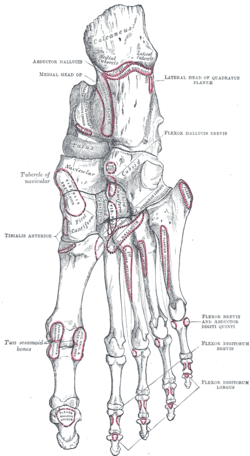Flexor hallucis brevis muscle
| Flexor hallucis brevis muscle | |
|---|---|
 Muscles of the sole of the foot. Third layer. (Flexor hallucis brevis visible at left.) | |
| Details | |
| Origin | plantar surface of cuboid and lateral cuneiform bones |
| Insertion | base of proximal phalanx of hallux |
| Nerve | medial plantar nerve |
| Actions | flex hallux |
| Antagonist | Extensor hallucis longus muscle |
| Identifiers | |
| Latin | musculus flexor hallucis brevis |
| TA | A04.7.02.057 |
| FMA | 37449 |
The Flexor hallucis brevis arises, by a pointed tendinous process, from the medial part of the under surface of the cuboid bone, from the contiguous portion of the third cuneiform, and from the prolongation of the tendon of the Tibialis posterior which is attached to that bone.
Structure
It divides in front into two portions, which are inserted into the medial and lateral sides of the base of the first phalanx of the great toe, a sesamoid bone being present in each tendon at its insertion.
The medial portion is blended with the Abductor hallucis previous to its insertion; the lateral portion with the Adductor hallucis; the tendon of the Flexor hallucis longus lies in a groove between them; the lateral portion is sometimes described as the first Interosseous plantaris.
Innervation
Flexor hallucis brevis is innervated by the medial plantar nerve.
Variation
Origin subject to considerable variation; it often receives fibers from the calcaneus or long plantar ligament. Attachment to the cuboid sometimes wanting. Slip to first phalanx of the second toe.
Function
It flexes hallucis together with musculus flexor hallucis longus
Additional images
| Wikimedia Commons has media related to Flexor hallucis brevis. |
 Bones of the right foot. Plantar surface.
Bones of the right foot. Plantar surface.- Flexor hallucis brevis muscle
- Flexor hallucis brevis muscle
References
This article incorporates text in the public domain from the 20th edition of Gray's Anatomy (1918)